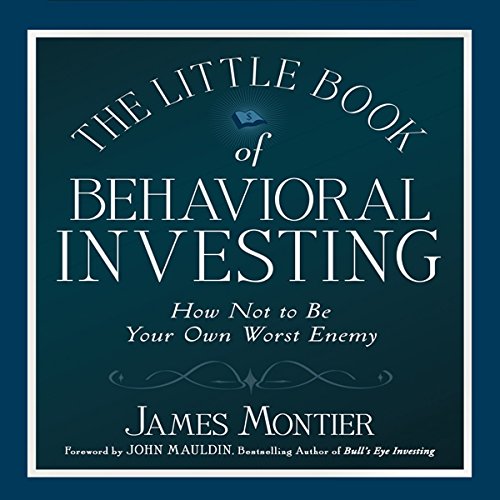
The Little Book of Behavioral Investing
How Not to Be Your Own Worst Enemy
Failed to add items
Add to basket failed.
Add to Wish List failed.
Remove from Wish List failed.
Follow podcast failed
Unfollow podcast failed
Buy Now for $21.99
-
Narrated by:
-
Sean Pratt
-
By:
-
James Montier
About this listen
Little book, big profits....
Here is a detailed guide to overcoming the most frequently encountered psychological pitfalls of investing.
Bias, emotion, and overconfidence are just three of the many behavioral traits that can lead investors to lose money or achieve lower returns. Behavioral finance, which recognizes that there is a psychological element to all investor decision-making, can help you overcome this obstacle.
In The Little Book of Behavioral Investing, expert James Montier, one of the world's foremost behavioral analysts, takes you through some of the most important behavioral challenges faced by investors. Montier reveals the most common psychological barriers, clearly showing how emotion, overconfidence, and a multitude of other behavioral traits, can affect investment decision-making. This book:
- Offers time-tested ways to identify and avoid the pitfalls of investor bias
- Discusses how to learn from our investment mistakes instead of repeating them
- Explores the behavioral principles that will allow you to maintain a successful investment portfolio
Written in a straightforward and accessible style, The Little Book of Behavioral Investing will enable you to identify and eliminate behavioral traits that can hinder your investment endeavors and show you how to go about achieving superior returns in the process.
©2010 James Montier (P)2010 Gildanworth the multiple listens
Something went wrong. Please try again in a few minutes.
Humble title, big ideas, brilliant!
Something went wrong. Please try again in a few minutes.
A fantastic book on inversting
Something went wrong. Please try again in a few minutes.
I particularly liked Montier's likening of conventional risk management strategies in finance to buying an airbag that keeps you safe, except when there's an accident.
Perhaps my one quibble is with Montier's discussion on forecasting. While I agree with the notion that forecasting an actual future is as delusional as it is widespread in finance, I have a philosophical disagreement with the blanket dismissal of "forecasting." In my view, forecasting is completely rational if the intent is to seek a range of plausible future outcomes. Investing is about pricing a plausible range of future outcomes, not predicting what the future will be. The difference between those two propositions is like chalk and cheese. But it's still forecasting, isn't it?
I reckon 80% of behavioral pitfalls can be circumvented simply by being analytical, numerate, and having contrarian instincts. Being analytical and numerate equips one with the tools to effectively bypass the more primitive parts of our brain, where most biases reside, when making judgments. I suspect this is as much, or more, the value of analysis as is the veracity of the analysis itself. Having contrarian instincts not only defends one against the widespread misjudgments that afflict markets, particularly groupthink, but also enables one to seek sectors and industries with the greatest potential—those suffering from low sentiment (i.e., where capital competition is lower).
This is why I believe professional engineers can make excellent investors, provided they are driven by fundamental principles (or first principles). However, not all engineers are. It is also crucial that their belief in their own abilities does not lead to overconfidence (one of Montier's biases) and that they fully commit to investing rather than merely dabbling on the side.
But then, as an engineer myself, this could be my own biases talking.
Worth returning to again & again
Something went wrong. Please try again in a few minutes.


